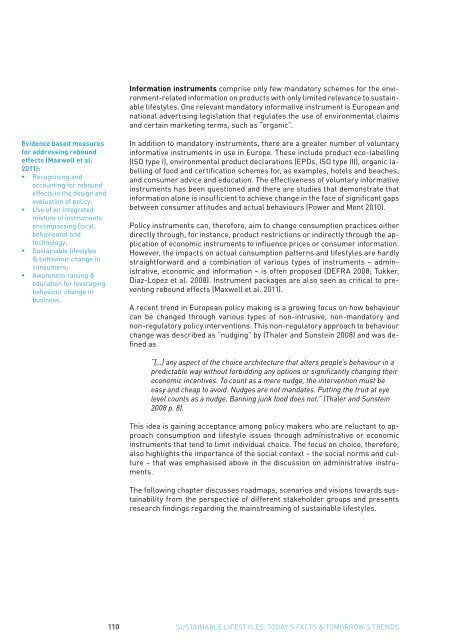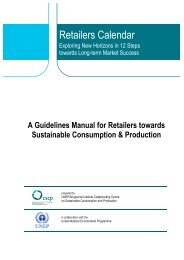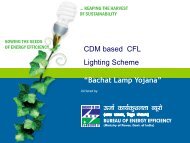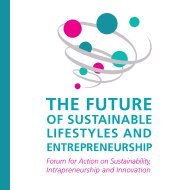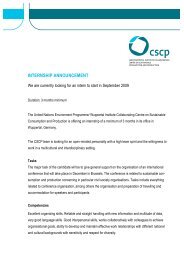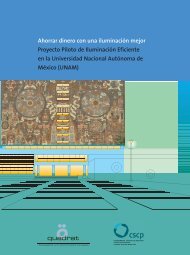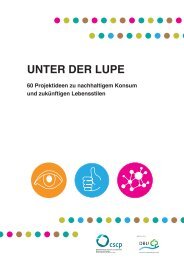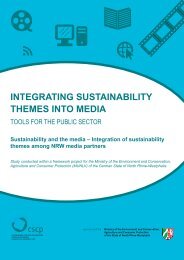today's facts & tomorrow's trends - SPREAD Sustainable Lifestyles ...
today's facts & tomorrow's trends - SPREAD Sustainable Lifestyles ...
today's facts & tomorrow's trends - SPREAD Sustainable Lifestyles ...
You also want an ePaper? Increase the reach of your titles
YUMPU automatically turns print PDFs into web optimized ePapers that Google loves.
Information instruments comprise only few mandatory schemes for the environment-related<br />
information on products with only limited relevance to sustainable<br />
lifestyles. One relevant mandatory informative instrument is European and<br />
national advertising legislation that regulates the use of environmental claims<br />
and certain marketing terms, such as “organic”.<br />
Evidence based measures<br />
for addressing rebound<br />
effects (Maxwell et al.<br />
2011):<br />
• Recognising and<br />
accounting for rebound<br />
effects in the design and<br />
evaluation of policy;<br />
• Use of an integrated<br />
mixture of instruments<br />
encompassing fiscal,<br />
behavioural and<br />
technology;<br />
• <strong>Sustainable</strong> lifestyles<br />
& behaviour change in<br />
consumers;<br />
• Awareness raising &<br />
education for leveraging<br />
behaviour change in<br />
business.<br />
In addition to mandatory instruments, there are a greater number of voluntary<br />
informative instruments in use in Europe. These include product eco-labelling<br />
(ISO type I), environmental product declarations (EPDs, ISO type III), organic labelling<br />
of food and certification schemes for, as examples, hotels and beaches,<br />
and consumer advice and education. The effectiveness of voluntary informative<br />
instruments has been questioned and there are studies that demonstrate that<br />
information alone is insufficient to achieve change in the face of significant gaps<br />
between consumer attitudes and actual behaviours (Power and Mont 2010).<br />
Policy instruments can, therefore, aim to change consumption practices either<br />
directly through, for instance, product restrictions or indirectly through the application<br />
of economic instruments to influence prices or consumer information.<br />
However, the impacts on actual consumption patterns and lifestyles are hardly<br />
straightforward and a combination of various types of instruments – administrative,<br />
economic and information – is often proposed (DEFRA 2008; Tukker,<br />
Diaz-Lopez et al. 2008). Instrument packages are also seen as critical to preventing<br />
rebound effects (Maxwell et al. 2011).<br />
A recent trend in European policy making is a growing focus on how behaviour<br />
can be changed through various types of non-intrusive, non-mandatory and<br />
non-regulatory policy interventions. This non-regulatory approach to behaviour<br />
change was described as “nudging” by (Thaler and Sunstein 2008) and was defined<br />
as<br />
“[...] any aspect of the choice architecture that alters people’s behaviour in a<br />
predictable way without forbidding any options or significantly changing their<br />
economic incentives. To count as a mere nudge, the intervention must be<br />
easy and cheap to avoid. Nudges are not mandates. Putting the fruit at eye<br />
level counts as a nudge. Banning junk food does not.” (Thaler and Sunstein<br />
2008 p. 8).<br />
This idea is gaining acceptance among policy makers who are reluctant to approach<br />
consumption and lifestyle issues through administrative or economic<br />
instruments that tend to limit individual choice. The focus on choice, therefore,<br />
also highlights the importance of the social context – the social norms and culture<br />
– that was emphasised above in the discussion on administrative instruments.<br />
The following chapter discusses roadmaps, scenarios and visions towards sustainability<br />
from the perspective of different stakeholder groups and presents<br />
research findings regarding the mainstreaming of sustainable lifestyles.<br />
110<br />
SUSTAINABLE LIFESTYLES: TODAY’S FACTS & TOMORROW’S TRENDS


